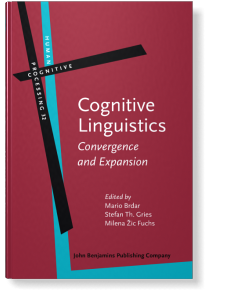Cognitive Linguistics
Convergence and Expansion
Editors
Cognitive Linguistics is not a unified theory of language but rather a set of flexible and mutually compatible theoretical frameworks. Whether these frameworks can or should stabilize into a unified theory is open to debate. One set of contributions to the volume focuses on evidence that strengthens the basic tenets of CL concerning e.g. non-modularity, meaning, and embodiment. A second set of chapters explores the expansion of the general CL paradigm and the incorporation of theoretical insights from other disciplines and their methodologies – a development that could lead to competing and mutually exclusive theories within the CL paradigm itself. The authors are leading experts in cognitive grammar, cognitive pragmatics, metaphor and metonymy theory, quantitative corpus linguistics, functional linguistics, and cognitive psychology. This volume is therefore of great interest to scholars and students wishing to inform themselves about the current state and possible future developments of Cognitive Linguistics.
[Human Cognitive Processing, 32] 2011. vii, 362 pp.
Publishing status: Available
© John Benjamins Publishing Company
Table of Contents
-
Editors and contributors | pp. vii–viii
-
Introduction: Convergence and expansion in cognitive linguisticsMario Brdar, Stefan Th. Gries and Milena Žic Fuchs | pp. 1–6
-
Part 1. Setting the scene
-
Convergence in cognitive linguisticsRonald W. Langacker | pp. 9–16
-
An overview of cognitive linguisticsAntonio Barcelona and Javier Valenzuela | pp. 17–44
-
Part 2. Consolidating the paradigm
-
Pattern versus process concepts of grammar and mind: A cognitive-functional perspectiveJan Nuyts | pp. 47–66
-
Metaphor in language and thought: How do we map the field?Gerard J. Steen | pp. 67–86
-
Emotion and desire in independent complement clauses: A case study from GermanKlaus-Uwe Panther and Linda L. Thornburg | pp. 87–114
-
Schematic meaning of the Croatian verbal prefix iz-: Meaning chains and syntactic implicationsBranimir Belaj | pp. 115–150
-
The conceptual motivation of bahuvrihi compounds in English and SpanishAntonio Barcelona | pp. 151–178
-
On the subject of impersonalsRonald W. Langacker | pp. 179–218
-
Part 3. Expanding the paradigm
-
Do people infer the entailments of conceptual metaphors during verbal metaphor understanding?Raymond W. Gibbs and Luciane Corrêa Ferreira | pp. 221–236
-
Corpus data in usage-based linguistics: What’s the right degree of granularity for the analysis of argument structure constructions?Stefan Th. Gries | pp. 237–256
-
Cognitive linguistics meets the corpusAnatol Stefanowitsch | pp. 257–290
-
Oops blush! Beyond metaphors of emotionHeli Tissari | pp. 291–304
-
Conceptual construal and social constructionPeter Harder | pp. 305–324
-
The biblical story retold: A cognitive linguistic perspectiveZoltán Kövecses | pp. 325–354
-
Name index | pp. 355–358
-
Subject index | pp. 359–362
“This book is a much-needed and timely addition to the fast-growing multidisciplinary endeavor of the field, representing both state-of-the-art research and cutting-edge studies in cognitive linguistics proper and its expansion into other fields of inquiry.”
Zhen-qiang Fan, Zhejiang Gongshang University, P.R. China, on Linguist List 23.2247 (2012)
“This volume offers a superb collection of fourteen articles on a wide range of interrelated topics within cognitive linguistics. Living fully up to its ambitious title, the book is based upon the keynote talks and papers presented at the “Converging and Diverging Tendencies in Cognitive Linguistics” conference, held in Dubrovnik (Croatia) in 2005, as well as a couple of papers that have been commissioned specifically for the present volume. Therefore, the six years that have elapsed between the conference and the publication of the book was definitively worth the wait, as the editors have managed to compile a volume that provides an excellent snapshot of where cognitive linguistics is right now, but at the same time also offers a glimpse into what the future might hold for cognitive linguistic research. [...] This book is a manifestation of the fact that cognitive linguistics is indeed ready and willing to expand, and can only benefit by the process, as expansion (resting on past convergences) can lead to future convergences. With this timely and widely applicable volume the editors have managed to compile a thought–provoking, yet highly enjoyable book that will serve as reference for plenty of linguists – within and outside of the cognitive linguistic paradigm – for years to come.”
Réka Benczes, in Suvremena Lingvistika 73, 2012, pages 115-120
Cited by (2)
Cited by 2 other publications
Huang, Mimi
2020. Chapter 9. Narrative modulation in the storytelling of breast cancer survivors’ transitional experiences. In The Language of Crisis [Discourse Approaches to Politics, Society and Culture, 87], ► pp. 255 ff. 
Scheibman, Joanne
2014. Referentiality, predicate patterns, and functions ofwe-utterances in American English interactions. In Constructing Collectivity [Pragmatics & Beyond New Series, 239], ► pp. 23 ff. 
This list is based on CrossRef data as of 18 july 2024. Please note that it may not be complete. Sources presented here have been supplied by the respective publishers. Any errors therein should be reported to them.
Subjects
Main BIC Subject
CFD: Psycholinguistics
Main BISAC Subject
LAN009000: LANGUAGE ARTS & DISCIPLINES / Linguistics / General
